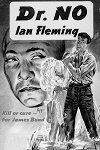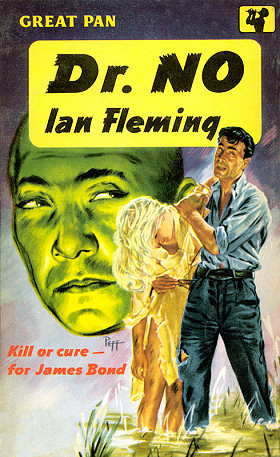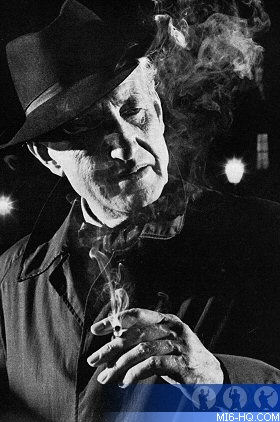|
|
|
 |
| |
MI6 travels back to 1958 for the release of Ian
Fleming's sixth James Bond novel "Dr No”,
when critics were still struggling with his mix of
sex, sadism and snobbery...
|
|
Time Tunnel: The Upper-Crust Low Life
3rd July 2007
By the summer of 1958, James Bond was on the radar of popular
culture as Ian Fleming's creation had previously charted five
literary adventures. The sixth, "Dr
No", would venture far from
the realistic
portrayal of espionage in the preceding title "From
Russia, With Love", and instead stray in to the realms of science fiction.
Even with its race-car pace and larger than life (titular) villain
dubbed "The Man in the Grey Tin-Foil", critics were still grasping
at Fleming's mix of sex, sadism and snobbery - including this
review from Time Magazine.
In literary London, where the vogue
in controversy runs to turtlenecked highbrows and Angry
Young Men, the latest brouhaha is whirling around an unlikely
book by an unlikelier author: a mystery shocker called
Dr. No, by an uppercrust Tory named Ian Fleming.
The book
marks the sixth appearance of James Bond, 007 by code number,
a deadpan British secret-service agent with high tastes
and low instincts. With the help of an estimated 1,250,000
British readers, Bond has boosted Creator Fleming high
on the bestseller lists and into the gunsights of outraged
critics. They blast him as a kind of Mickey Spillane in
gentleman's clothing, his books as "a cunning mixture
of sex, sadism and money snobbery" and "a bad
symptom of the present state of civilization in this country." If Author Fleming is guilty of using the
old school tie as a cultural garrote, it is, fittingly
enough, his own. Educated at Eton and Sandhurst, 49-year-old
Ian Fleming served in Naval Intelligence during World War
II, is now foreign manager of the proper Sunday Times.
He is married to the former Lady Rothermere, whose press-lord
husband named him as corespondent in a divorce suit in
1952. |
|

Above: 1st edition Jonathan Cape hardback
(UK). Artwork by Pat Marriott. |
At Goldeneye, his luxurious Jamaica residence,
Clubman Fleming has been host to his convalescing friend, Sir
Anthony Eden. His critics find his shockers all the more unspeakable
because he is so much a member of The Establishment.* Yet
Fleming is no Spillane. His closest U.S. opposite number, Raymond
(The Big Sleep) Chandler calls him "masterly." And
Novelist Elizabeth Bowen says: "Here's magnificent writing."
The Man In The Grey Tin-Foil
Not all readers will agree that Dr. No, which Macmillan will publish in the U.S.
in July, is magnificent writing, but pages of it, at least, qualify for Ezra
Pound's classic comment on Tropic of Cancer: "At last, an unprintable
book that is readable."
 Above:
British Pan paperback 1st-3rd editions (1960 onwards). Above:
British Pan paperback 1st-3rd editions (1960 onwards).
|
|
Secret Agent Bond is sent to Jamaica to investigate
some mysterious goings-on on a neighboring island. His unknown foes promptly
plant a six-inch venomous centipede in his bed ("Bond could feel it
nuzzling at his skin. It was drinking! Drinking the beads of salt sweat!").
Bond
gets to the small island, drops off to sleep only to awaken to the sight
of a beautiful girl, nude but for a wide leather belt around her waist
("the
belt made her nakedness extraordinarily erotic"). After his faithful
native servant is scorched to death by a flamethrower Bond and the girl are
ushered into the presence of the diabolical Dr. No.
A sort of rich man's Fu Manchu, Dr. No is one of the
less forgettable characters in modern fiction. He is 6
ft. 6, and looks like "a giant venomous worm wrapped
in grey tin-foil." For hands he has "articulated
steel pincers," which he habitually taps against his
contact lenses, making a "dull ting." Dr. No's
hobby is torture ("I am interested in pain").
Bond survives Dr. No's inventive obstacle
course from electric shocks to octopus hugs, buries his
tormentor alive under
a small mountain of guano, and rescues the girl from
a fate as a tasty snack for some giant land crabs. |
After giving Dr. No the giant-land-crab treatment, the New Statesman's
Critic Paul Johnson suggested that Fleming fans were psychosocial
cousins of prison torturers in Algeria. In the current Twentieth
Century, Bernard Bergonzi called Fleming's attitude toward sex
that "of a dirty-minded schoolboy." He noted that the
women are usually pushovers in a Fleming novel, and cited a bra-and-pantie-clad
minx named Tiffany Case, who says not too long after she meets
Bond: "I want it all, darling . . ."
Bath Cubes By Guerlain
But the critics sound as if they might be kinder to Bond's non-U. penchant for
drop-kicking the men and devil-dealing the ladies if he were not such a dandy
among the consumer goods, a slave to "crude snob-cravings." The monocle
glitters over the private-eyeful afforded by Agent Bond. He smokes Macedonian
cigarettes marked with three gold rings. He drinks Dom Perignon champagne,
drives a Bentley. At Blades, a posh St. James's Street club that he frequents, "no
newspaper comes to the reading room before it has been ironed." He-Man
Bond's bath water is scented with Floris Lime bath essence, while his babes
splash self-indulgently amid Guerlain bath cubes. To Critic Bergonzi, these
cushy "fantasies of upper class life can only be a desire to compensate
for the rigors of existence in a welfare state: they have an air of vulgarity
and display."
Unsubdued and perfectly self-assured, Author Fleming
finally took to print in his own defense. Too much violence?
Answers
Fleming in the Manchester Guardian: true to "real
spy-life." Too much sex? Replies Fleming: "Perhaps
Bond's blatant heterosexuality is a subconscious protest
against the current fashion for sexual confusion." Too
much snobbery? "I had to fit Bond out with some theatrical
props ... I myself abhor Wine-and-Foodmanship. My own favorite
food is scrambled eggs." Yet, though he has never
been known to kick anyone in the groin, and fancies his
own Ford Thunderbird over a Bentley, Author Fleming strikes
his friends as "awfully like Bond really, appearance,
clothes, Floris bath essence and all."
Says Fleming equably: "I am not an entrant in the
Shakespeare stakes. I began writing these books because
my mental hands were empty and as an antibody to my hysterical
alarm at getting married at the age of 43." As for
the harsher critics, "they have so many chips on their
shoulders they should go into the timber business. I do
however apologize for once making Bond order asparagus
with bearnaise, instead of mousseline sauce. A writer should
acknowledge his shortcomings." |
|

Above: Ian Fleming |
*A flexible term,
usually critical, for the British ruling class's ruling class,
e.g., the Archbishop
of Canterbury and all Anglican
bishops, certain peers with long bloodlines, top civil servants,
Etonian Tories, staunch monarchists, and Times leader writers,
all of whom together constitute what has been called "the
old-boy circuit" or "the stately domes of England."
Related Articles
 "Dr
No" Literary Coverage "Dr
No" Literary Coverage
|
|
|